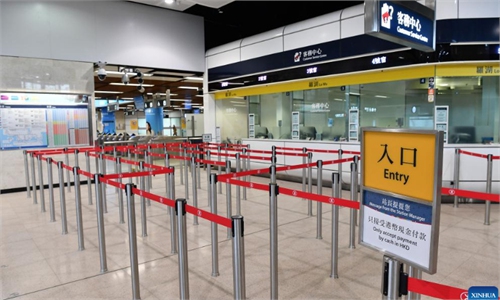
Illustration: Chen Xia/Global Times
While the Japanese government maintains its COVID-19 border control rules for travelers from China, which were strengthened late last year, some Japanese media outlets continue to report that the country's tourism sector has been eagerly awaiting the return of the Chinese, the largest contingent of visitors to Japan before the start of the COVID-19 pandemic. Expectation in the tourism market has made Tokyo's border control increasingly embarrassing.Japan's Kyodo News on Monday reported that tourism practitioners hope China can resume overseas group tours to Japan, after the media outlet said two weeks ago that the country's tourism sector has been eagerly awaiting the return of Chinese travelers. The report said some research institutions estimated that annual consumption by visitors to Japan will reach 3.1 trillion yen ($23.4 billion), about 60 percent of the 2019 level, but the estimation is based on the premise that tourist arrivals from the Chinese mainland will recover after the summer, otherwise, this will not be achieved.
It is understandable to see Japanese tourism's high expectation for the return of Chinese visitors. Frankly speaking, Japan's tourism sector is unable to get a "bona fide" rebound without Chinese travelers. The country saw 31.9 million inbound tourists in 2019, among which visitors from the Chinese mainland and Hong Kong scored an overwhelming top share of about 11.89 million, or 37 percent of the total, the Japan Times reported, citing data from the Japan National Tourism Organization. If Japan cannot attract Chinese tourists, there will be no country that can make up the gap left by this group. A big boost from the recovery of inbound tourism to pre-pandemic levels will turn out to be just empty talk without the return of Chinese travelers.
Before the pandemic, Japan's tourism industry was booming. Data from Japan External Trade Organization JETRO showed that travel and tourism sector contributed $359 billion to Japan's GDP in 2019, making it the world's third-largest market in this sector after the US and China. Some analysts said the key to reviving the Japanese economy will depend on whether the government can make the tourism industry resilient and sustainable, but the Japanese government has obviously failed to satisfy people's hope for tourism recovery.
Japan has tightened border controls for COVID-19 by requiring tests for all visitors from the Chinese mainland. Chief Cabinet Secretary Hirokazu Matsuno was quoted as saying last week that Japan will maintain for the time being its COVID-19 border control rules, although tourism related practitioners are strongly dissatisfied.
China on Monday resumed overseas group tours for Chinese citizens to 20 countries including Thailand, Indonesia and Cambodia, with Japan excluded from the list. The result is in line with expectations.
Some Southeast Asian countries like Thailand have become the first destinations for many Chinese tourists as the country resumed overseas group tours. Outbound tourism to Southeast Asia has heated up almost immediately since China optimized COVID-19 management measures at the end of last year. Why? It's partly because those countries have a friendly attitude toward Chinese tourists.
"Thailand is every Chinese traveler's dream destination, and the Tourism Authority of Thailand (TAT) has launched the 'Two Lands, One Heart' travel promotion to welcome them," Nation Thailand reported. Government spokesman Anucha Burapachaisri was quoted as saying on Monday that TAT is planning to increase the frequency of flights to attract Chinese visitors. It is clear that Thailand hopes that the return of Chinese tourists can offer a boost for its economy in 2023.
No matter how Japanese officials justify the work on border controls, they cannot deny that Japan has lost completely in the first round of competition to attract Chinese tourists, and has missed the economic growth opportunities brought by tourism recovery. Comparing Japan with Thailand's enthusiasm toward Chinese tourists, Tokyo's political prejudice, which has hurt the recovery of the economy, seem naive and ignorant. Southeast Asia's enthusiasm for Chinese travelers should arouse reflection in Japan.
The author is a reporter with the Global Times. bizopinion@globaltimes.com.cn



